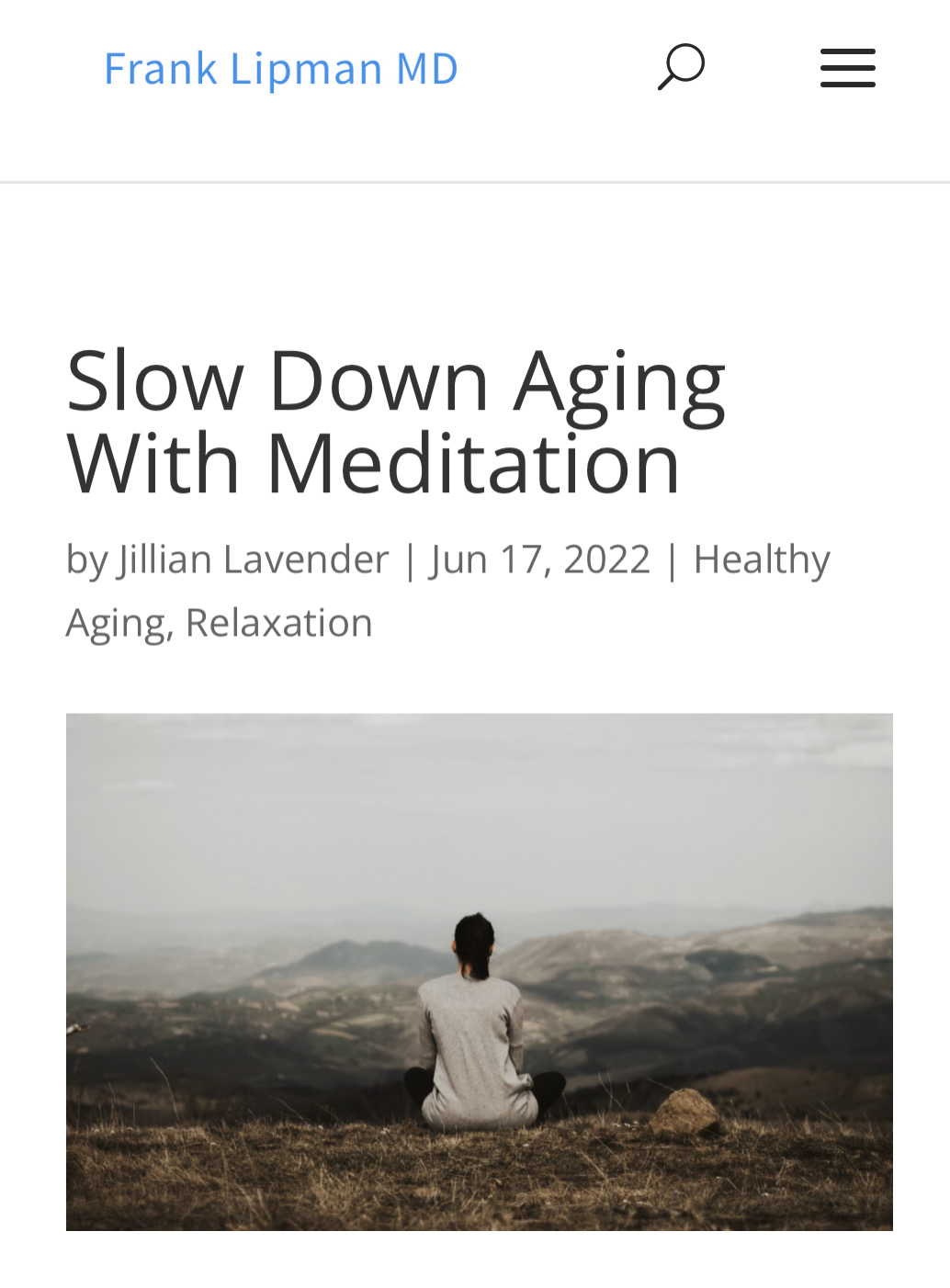In my latest article for Frank Lipman, MD, Functional Medicine leader and New York Times bestselling author, I share an excerpt from my book, Why Meditate? Because It Works, about how Vedic Meditation slows down the ageing process.
“When we think of getting older we naturally mean how many birthdays we’ve had. Using chronological age is the normal way people determine how old they are. Yet basing age on how many times the Earth has gone round the sun is a pretty limited way of looking at the rate at which someone is aging. Everyone ages differently. We all know people who seem youthful and dynamic well into their seventies and eighties and then others who at fifty have the air of someone decades older.
I remember a man in his early forties who came to learn to meditate. He had a very demanding role in finance in the City of London, and a young family who he didn’t see very much. He had a long commute to a job he didn’t really like. He explained he felt trapped because he was very well paid and had a lot of expenses, including private school fees and a big mortgage. He wasn’t sleeping well, drank alcohol most nights to unwind, had no time for exercise and was feeling anxious and unhappy. He’d recently been for a physical check-up and was put on blood pressure medication, told to lose 10 kg and to reduce his stress levels.
It was a wake-up call. His father had died relatively young from a heart attack, and he was terrified he was heading down the same path. He’d read about some top hedge fund manager who credited meditation for his success and he thought he’d check it out.
Biological age vs chronological age.
Whilst some of this man’s situation may be down to genetics, the largest factor was how he was living his life. Poor sleep, unhealthy diet, lack of exercise, high stress levels and lack of job satisfaction, were all creating a fast-track to rapid aging. Even though his chronological age was only forty-three, I’m sure his biological age was much older.
The Adult Growth Examination (AGE) was developed by Robert Morgan in 1968 to provide a standardized test determining the rate at which someone is aging. By measuring three primary markers of hearing, near-point vision and systolic blood pressure, a simple, reliable test of someone’s biological age was devised.
When AGE is applied in studies, it shows clearly that meditation slows down the aging process. One study compared meditators to an extensive body of data collected by the U.S. Public Health Service. Long-term meditators (those who had been meditating for five years or more) were an average of 12 years younger than their chronological age. Not surprisingly, how long someone had been meditating impacted the results. Yet even those who had been meditating for less than five years had a lower biological age – around five years less than their chronological age.
Stress leads to premature ageing.
It makes sense that if you’re calmer and more adaptable you’re going to be less stressed. The knock-on effect is that with less wear and tear on the body and less disturbance of the mind, you will not age as quickly.
In Vedic Meditation, as thinking becomes more quiet, the body rests. As the mind continues to settle, the body becomes even more restful. Then a point comes when the activity of the mind is so refined it’s almost imperceptible and finally the thoughts go. The mind falls mute. In this state of least-excitation the metabolic rate has nearly reached zero. By regularly experiencing this ground state, the meditator counter-balances the wear and tear of daily life. This twice-daily experience allows the nervous system to recharge, renew and repair. The aging process slows down.
DHEA-S – the hormone of longevity.
When it comes to aging, there are many hormones that play a part. One stand-out biomarker of aging is dehydroepiandrosterone sulphate (DHEA-S). This hormone, found in the adrenal glands, is at its highest level when you’re a young adult and then declines as you age. Higher levels of DHEA-S have been associated with a stronger immune system, less heart disease, greater bone density and longevity. Low levels of DHEA-S in women have been linked to breast cancer.
A 1980s study of middle-aged and older meditators showed that they maintained higher levels of DHEA-S than a non-meditating control group. In fact DHEA-S levels in the meditators were on a par with levels of non-meditators five to ten years younger. This is exciting because it shows that, rather than relying on drugs and artificial means, we have the capacity to retard the premature aging process naturally, by normalizing the delicate hormonal balance from within.”
– Jillian Lavender is co-founder of London Meditation Centre and New York Meditation Center. This is an exceprt from her first book, Why Meditate? Because it Works.
